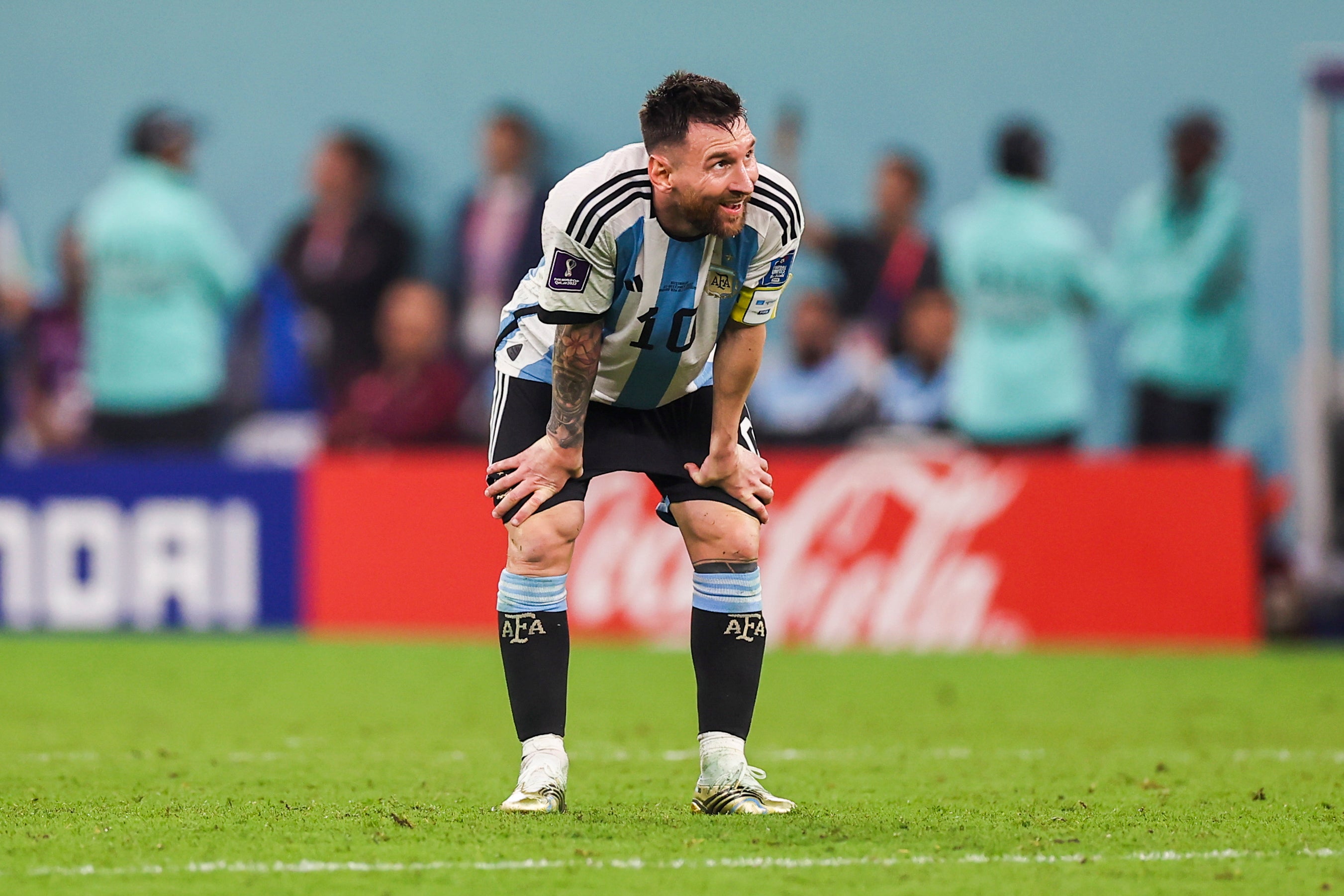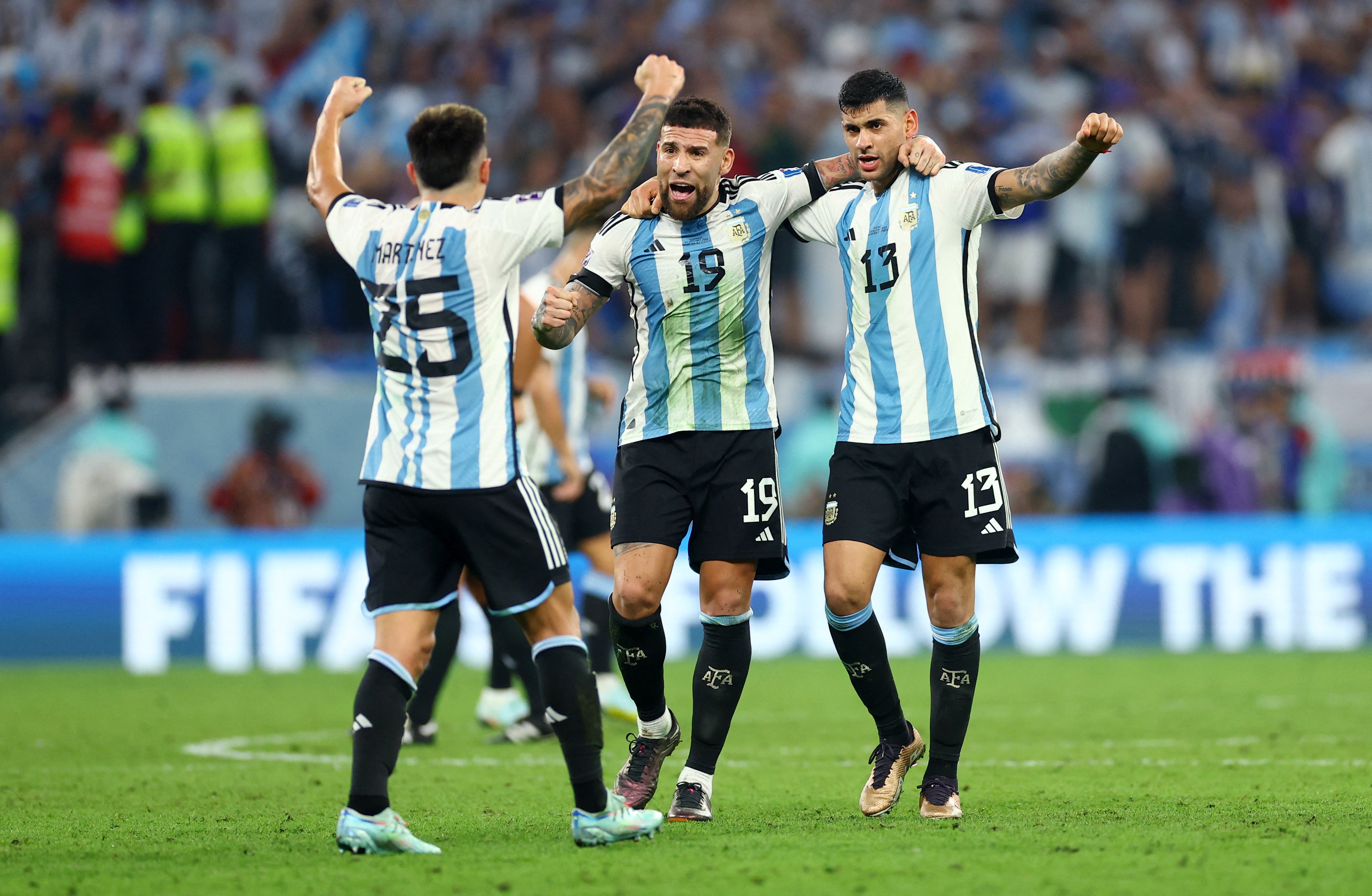Lionel Messi finds the ‘fire inside’ to leave galvanised Argentina with ‘goosebumps’
Messi delivered a signature finish in the 2-1 last 16 victory over Australia as the Albiceleste’s quest for a third World Cup continues
The Argentina players instantly knew that Aziz Behich had made a mistake, and that Lionel Messi was going to “bring out that fire inside”. It gives them “goosebumps”, in the words of Lisandro Martinez.
Messi had actually been pretty poor in the first half-hour of the last-16 match against Australia, misplacing three successive passes. It was then that Behich got into a flare-up, pulling his shirt to also pull Messi over the line, and something changed. The Argentina players have seen it before.
They love it when he’s angry.
“We know that when something like that happens to him, he has the personality to make it serve him and somehow play better,” Alexis Mac Allister says. “He brings out that fire inside, that personality that becomes even bigger than it is and, in this level of match, he makes himself big.
“He has that touch, that just appears out of nowhere, to win.”
That’s saying something. The touch that set off the move for the goal was something else, Messi taming a wild ball with the most delicate subtlety. It was then complemented by that “fire”. The next ball wasn’t supposed to go to Messi, but he made sure to take it. He’d been riled.
“The pass was for [Nicolas] Otamendi,” Mac Allister revealed. “I think he was a bit surprised! But luckily it went to Messi who scored the goal.”
There was no luck about the goal itself, even as people attempted to blame Mat Ryan for that, too. It wasn’t that the goalkeeper should have got his hand to it. It’s just that Messi has perfected a technique where he knows how to exactly place that type of finish. It’s almost surgical.
“We’ve seen it hundreds of times,” Australia’s Jackson Irvine says. “So ruthless, so clinical, and ultimately that was the difference.”
Messi himself seemed on a different level after that, and he went from ambling around the pitch almost at walking pace to running the game and constantly coursing through the entire Australian defence.

“To see how he runs, the effort that he makes, to chase the ball in the final minutes of the match, it gives you goosebumps,” Lisandro Martinez says. “As a teammate, you give everything for him.”
Messi also gives his teammates so much - not least so many chances to score. There were more than a few echoes of Diego Maradona in 1986 from Saturday’s performance. One famous compilation of the late Argentina great from that World Cup shows him repeatedly opening space by drawing and beating defences with moments of unique genius, only for a teammate to waste the opportunity he’d serve up. Maradona never once looked angry or frustrated but would instead applaud them and encourage them.
It was like this with Messi and, especially, the off-form Lauturo Martinez. The captain served his striker at least two chances to kill the game.

“He’s the most important player, he knows it, he helps us a lot and we’re proud to accompany him,” Mac Allister added.
This is something else that comes across on speaking to the Argentine players. When they talk about Messi as the greatest of all time or how brilliant he is with them, there is never any sense they are only saying it because that is what his ego demands or they are expected to. They are instead gushing. Mac Allister had a wide smile on his face as he spoke about Messi at length.
“It’s a source of pride for me to be beside him, trying to give him the ball, to make sure that the ball goes through him because, if he gets it, everything is much easier,” the Brighton star said. “I think he’s having a great World Cup and we need him a lot.”
“To have him as a teammate makes me very proud,” Lisandro Martinez added.
That points to another side to what Mac Allister otherwise described as a “dirty” win.
While Messi could have been frustrated with Lauturo Martinez, he was left grateful to the other Martinezes at the back: Lisandro and Emi. The goalkeeper made one strong and essential save from Garang Kuol. Lisandro Martinez got across to prevent Behich - of all people - finishing a sensational run that seemed set for a certain goal.
“I don’t know what I did,” the Manchester United defender said. “I felt the ball hit me from outside and when this kind of thing happens, sometimes, as defenders, we celebrate like it’s a goal of our own.”

It meant Messi was right in the heart of the celebrations again at the end, some of the players twirling their shirts over their heads like the thousands of Argentine fans they were in communion with.
These post-game festivities have become an event in themselves, another core part of the experience an Argentina game at a World Cup genuinely is. The squad again spent two hours in the dressing room after this win celebrating, with Fifa officials basically pleading to “get them out” so they could fulfil their media duties. Messi is always the last out, but also makes a point of always stopping to speak. The media that congregate around Messi is an event in itself.
Those close to the Argentina squad talk of how he has embraced a new role as a vocal leader of the team as he enters this late stage of his career. You might call it an imperial phase, given it’s almost like he presides over events before deciding when to exert his influence. There’s little doubt it’s a very different Messi to that of his three different peaks in 2009, 2011 and 2015.
This was something that struck for Irvine, who was one of the Australia players most charged with trying to keep him quiet.
“It’s his understanding of the game and how he picks and chooses his moments of when to come to life,” the defender says. “When he does, it’s hard to stop. We controlled him so well for most of the first half, all of their threats. We played really well… but it’s that one little moment, that one half-metre you give him in the box.”
It means Messi has at least one more game in this most illustrious of competitions, and the one he wants more than any other. There is a sense of history weighing over each of his matches now, which the opposition also feel.
“For a player like myself, who’s never played at the highest level domestically, it’s probably the only chance I’ll ever get to share the pitch with arguably the greatest to ever do it,” Irvine says. “Obviously it’s a bit surreal. That’s a moment to reflect on at the end of the tournament, to look back and say you got to compete with one of the greatest.”

It is even more of a privilege to play alongside him - and more profound again for Mac Allister, whose father, Carlos, played with Maradona.
“We always have this discussion! For my father, Maradona was very important, not just in his career, but in his personal life,” Mac Allister adds. “He was very grateful for that. For me it’s a source of pride to be alongside Leo, and play with him and for me obviously he’s the best in history. It’s a discussion we always have, my father says Maradona is the best in history, for me it’s Messi, but I don’t think it’s a discussion we’ll finish!”
Messi’s World Cup isn’t finished yet. His teammates believe it’s only getting going.
Join our commenting forum
Join thought-provoking conversations, follow other Independent readers and see their replies
Comments


Bookmark popover
Removed from bookmarks